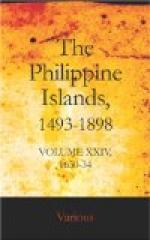forth. He cut another, and rice came out.
These articles he had hidden there cunningly and adroitly.
Consequently those men were convinced, and became preachers
of those lies, which the Indians love and believe so
readily; while we have no power to enable us to persuade
them of the certainty of our faith so readily as this
sort of trickery can influence their natural disposition.
In such manner spread the spark that there was no island
where it did not catch little or much; although they
did not dare to show their faces, but awaited the
result in Bohol. The fathers warned the city
of Santisimo Nombre de Jesus, and came to solicit aid
from the alcalde-mayor. Here there were no evil-doers
among those [natives] who lived in the city.
Don Juan de Alcarazo did not dare [to send out troops],
as he had no order from the governor, Don Alonso Fajardo,
and it might be imputed to him as a blameworthy act.
But the fathers, seeing that whatever delay occurred
was to make the wound incurable, surmounted all difficulties.
Consequently, they were able to negotiate with potent
arguments, saying that it was especially important
to check the evil in its first stages, so that it
should not spread. The alcalde-mayor was persuaded,
and assembled the soldiers and adventurers who appeared
most suitable to him, besides a number of Sugbu Indians,
armed with sword and buckler. With these he landed
in Bohol, and went to look for the enemy—who,
courageous in their mountains and supplied with rice,
thought that they were most safe, and that victory
was sure.
But the most diligent effort made by this gentleman
was to go to our convent to have a mass said to the
Holy Child, before whom many candles were burned;
to promise to take Him as patron; and to perform no
action in that war which should not be done in His
name. Since His [Divine] Majesty, he said, had,
by His favor, given those islands to the Spaniards,
he prayed that He would not permit them to lose, for
his sins, those that they already possessed. For
the Christianity founded therein with so great toil
would be wholly lost, and the victorious enemies of
His name would leave no kind of evil undone to the
conquered, to the contempt of His name. The most
Holy Child showed Himself very gracious, as is His
custom in events [that are to be] prosperous, whereupon
victory was regarded as sure. Encouraged by such
omens, they did not hesitate to attack the enemy, who
were entrenched in their fields. The latter were
insolent, and reenforced with allies and supporters.
During the battle, the rain was so heavy that they
could not use the arquebuses, so that the enemy were
beginning to prevail. Thereupon, the shields
of the Sugbu Indians were brought into service, and
the latter aided excellently, by guarding with them
the powder-flasks and powder-pans of the arquebuses,
so that they were fired with heavy loss [to the enemy].
When the shower of rain came, the enemy’s babaylan
encouraged them by saying that there they could see




